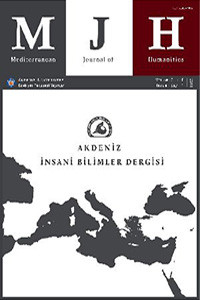Öz
The Elizabethan regime in its last fifteen years faced many socio-political tensions. Although disorganised at first, as time passed, tensions increased and attempts were made to voice aloud socio- political criticisms, but use of the repressive state apparatus of the judicial system suppressed these. Accordingly, public execution was employed to exert the executive powers of the monarch against dissent. Deserved punishment in the theatre’s public executions could create a cathartic effect, reducing tensions about injustice that was felt by the Elizabethan playgoers in real life. Yet, the arbitrariness of justice in the executions on and off the stage complicated the creation of such a catharsis, as displayed, especially, in Shakespeare’s first tetralogy (ca. 1589-1594). Accordingly, this article analyses the politics and poetika of public execution and it suggests that scenes of executions in theatres increased the socio- political tensions caused by the injustice of the Late Elizabethan Period.
Anahtar Kelimeler
Shakespeare History Plays First Tetralogy Public Execution Politics Poetics
Kaynakça
- Agamben G. (1998). Homo Sacer: Sovereign Power and Bare Life. Trans. D. Heller-Roazen. Stanford 1998.
- Althusser L. (1971). “Ideology and Ideological State Apparatuses: Notes towards an Investigation”. Trans. B. Brewster, Lenin and Philosophy and Other Essays (1971) 127-186. New York and London.
- Anonymous. (1593). The Life and Death of Iacke Straw, A Notable Rebell in England. London 1593.
- Anonymous. (1594). The True Tragedie of Richard the Third. London 1594.
- Archer I. W. (1991). The Pursuit of Stability: Social Relations in Elizabethan London. Cambridge 1991.
- Arnold O. (2007). The Third Citizen: Shakespeare’s Theater and the Early Modern House of Commons. Baltimore 2007.
- Ashley L. R. N. (1988). Elizabethan Popular Culture. Bowling Green 1988.
- Baldo J. (2012). Memory in Shakespeare’s Histories: Stages of Forgetting in Early Modern England. London - New York 2012.
- Baldwin W. (1563). A Myrrovr for Magiſtrates. London 1563.
- Bernthal C. A. (2002). “Jack Cade’s Legal Carnival.” Studies in English Literature, 1500-1900 42/2 (2002) 259-274.
- Bracton H. (1968). Bracton de Legibus et consuetudinibus Angliae: Bracton on the Laws and Customs of England. Eds. and trans. G. E. Woodbine & S. E. Thorne. 2 vols. Cambridge 1968.
- Brown R. A. & Curnow P. E. (1984). Tower of London, Greater London. London 1984.
- Campbell L. B. (1978). Shakespeare’s Histories: Mirrors of Elizabethan Policy. San Marino 1978.
- Chambers E. K. (1961). The Elizabethan Stage. 4 vols. Oxford 1961.
- Collingwood R. G. (1956). The Idea of History. Oxford 1956.
- Crawforth H. (2015). “Violence in Shakespeare’s London: Titus Andronicus (1594) and Tyburn”. Eds. H. Crawforth, S. Dustagheer & J. Young. Shakespeare in London (2015) 21-45. London.
- Cressy D. (2010). Dangerous Talk: Scandalous, Seditious, and Treasonable Speech in Pre-Modern England. Oxford 2010.
- Cunningham K. (1990). “Renaissance Execution and Marlovian Elocution: The Drama of Death”. PMLA 105/2 (1990) 209-222.
- Deiter K. (2008). The Tower of London in English Renaissance Drama: Icon of Opposition. New York - London 2008.
- Denny J. (2006). Anne Boleyn: A New Life of England’s Tragic Queen. Cambridge 2006.
- Djordjevic I. (2010). Holinshed’s Nation: Ideals, Memory, and Practical Policy in the Chronicles. Burlington 2010.
- Dutton R. (1991). Mastering the Revels: The Regulation and Censorship of English Renaissance Drama. Hampshire - London 1991.
Ayrıntılar
| Birincil Dil | Türkçe |
|---|---|
| Konular | İngiliz ve İrlanda Dili, Edebiyatı ve Kültürü |
| Bölüm | Araştırma Makaleleri |
| Yazarlar | |
| Yayımlanma Tarihi | 30 Aralık 2016 |
| Yayımlandığı Sayı | Yıl 2016 Cilt: 6 Sayı: 2 |
| Adres: Akdeniz İnsani Bilimler Dergisi Akdeniz Üniversitesi, Edebiyat Fakültesi 07058 Kampüs, Antalya / TÜRKİYE | E-Posta: mjh@akdeniz.edu.tr |


